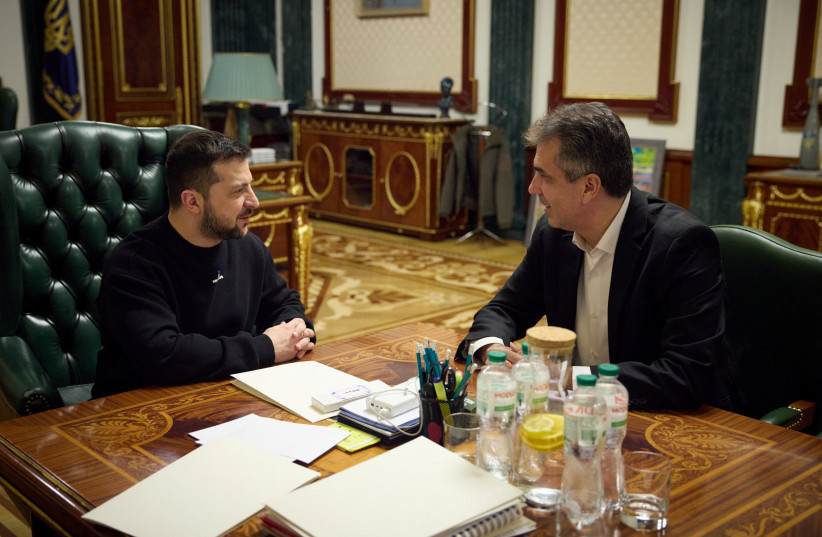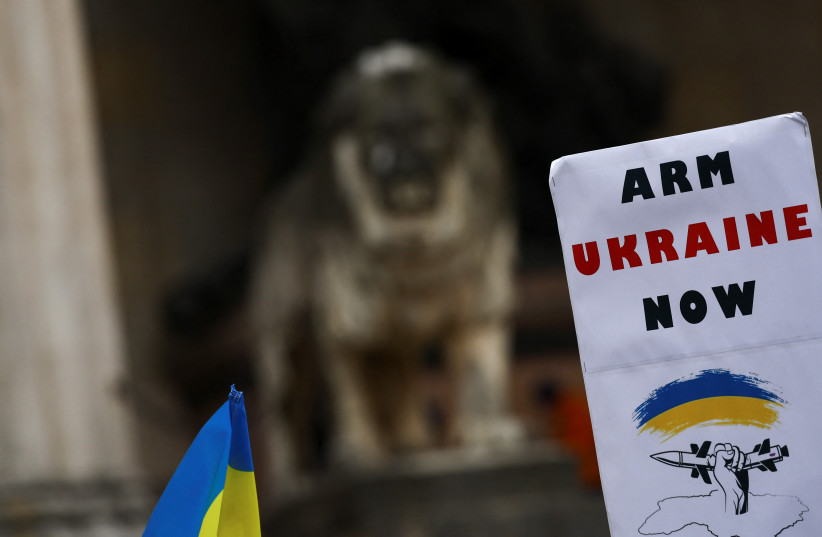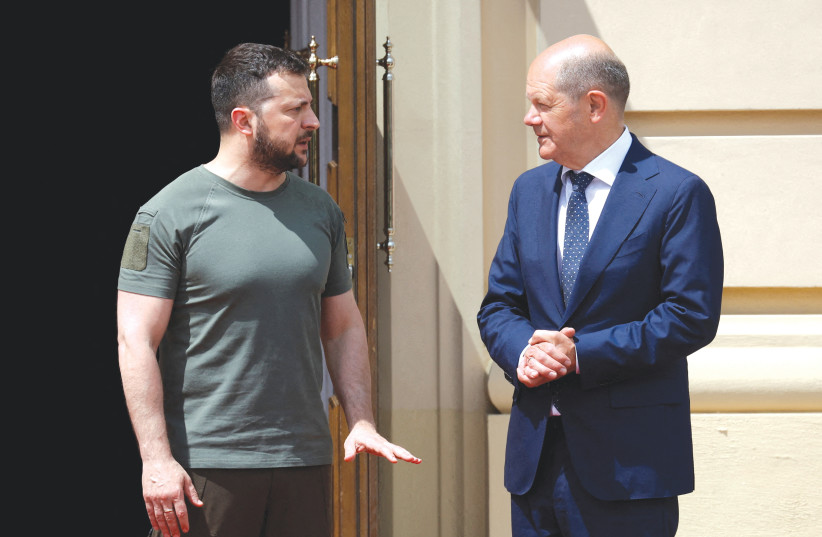Israel will eventually provide Kyiv with the advanced anti-missile system known as David’s Sling, Ukrainian President Volodymyr Zelensky told the Munich Security Conference on Friday as he appealed to the world leaders there to speed up weapons delivery to his war-torn country.
Zelensky compared Ukraine’s defensive war against Russia to a David-against-Goliath struggle for freedom, as he drew an analogy between David’s use of a slingshot to fell the giant Goliath and his country’s need for an Israeli state-of-the-art defensive system known as “David’s Sling.”
“Being David is fighting and we are fighting,” Zelensky told the conference.
“Being David is having a sling to win, we do not have yet the David Sling from Israel, but I believe it is just temporarily,” Zelensky said in a speech he delivered in English.
David’s Sling was jointly developed by the Israeli company Rafael and the US company Raytheon and is used by the IDF. According to the Rafael site, it’s a “complete air defense system to defeat the full spectrum of air and missile threats.”

Eli Cohen returns from Ukraine
Zelensky spoke about David Sling just one day after Israel’s Foreign Minister Eli Cohen visited Kyiv and met with him.
Ukraine has pressed Israel without success to provide it with anti-drone and anti-missile technology. Cohen in his conversations with Zelensky and with his Ukrainian counterpart Dmytro Kuleba explained the complexity of Israel’s situation with the Russians, particularly given its military presence in Syria on Israel’s northern border.
Cohen did not appear to have acceded to Ukraine’s request while in Kyiv. Kuleba expressed frustration publicly during the two ministers’ joint press statement.
Israel instead offered increased humanitarian assistance, the delivery of a civilian warning system to alert civilians to the location of incoming missiles and international support at the United Nations against Russia.
“Being David is having a sling to win, we do not have yet the David Sling from Israel, but I believe it is just temporary.”
Ukrainian President Volodymyr Zelensky
Cohen was the first high-level Israeli official to visit Ukraine since the start of the war last year. As his plane descended into Israeli airspace on Friday, he spoke to those on board over the loudspeaker and said he felt the trip had been a success and helped repair the relations between the two countries.
He pointed in particular to the statement Zelensky released after the visit, in which he said that “Israel had always been our important partner in the Middle East.”
Cohen said that in the past year Ukraine has been highly critical of Israel, but to receive a statement like this after the visit was an important message for the Jewish state and the world about relations between the two countries.
Improved Israeli-Ukrainian ties also have a positive impact on Israel’s international campaign against Iran, Cohen said. Israel has emphasized that receiving a commitment from Ukraine to work with it against Iran was an important part of the visit. The link between them when it comes to Iran has been highlighted by Russia’s use of armed drones against Ukrainian citizens.
Zelensky stresses immediate danger caused by Russia, Iran
In his speech to the Munich conference, Zelensky referenced lethal Iranian drones in the Ukrainian skies as well as Iran’s continued enrichment of uranium in its pursuit of building nuclear bombs.
In urging an increased delivery of arms, Zelensky said that Russia was setting its sights on other countries in eastern Europe. Moscow was wreaking destruction and plotting to “strangle” Ukraine’s neighbor Moldova while Western leaders dragged their feet, he explained.

It was “obvious” that Russian President Vladimir Putin had set his sights on other former Soviet countries, Zelensky said.
“Determination is never abstract. David defeated Goliath not by the power of conversation, but by the power of his actions,” said Zelensky.
“Delay has always been and still is a mistake,” Zelensky told the conference, where hundreds of politicians, military officers and diplomats have gathered. “Goliath must lose” for the world to be safe, he added.
Zelensky’s spoke at the same event in 2022 just days before the war broke out. As on previous occasions, he mixed gratitude for Western aid with pointed comments that assistance should have come sooner.
Aside from David’s Sling, Ukraine is asking for fighter jets and advanced battle tanks, telling global leaders assembled in Munich that dithering also threatened their security.
“We will not allow President Putin to win this war, it (would) be a tragedy for Ukraine but also dangerous for us.”
Atlantic alliance’s Secretary-General Jens Stoltenberg
His message at the start of a conference heavily focused on Europe’s transformed security landscape won immediate endorsement from German Chancellor Olaf Scholz and French President Emmanuel Macron.
Both leaders, who critics have accused of equivocating over their countries’ response to the war, pledged commitment to military support for Ukraine, and said long-term backing for Kyiv’s cause was the only way to get Moscow to back down.
Europe fails to agree on Ukraine strategy
The conference has reignited long-running debates over how much Europe should build up its own military capacity, how much it should rely on the United States and how much governments should spend on defense.
But with a Russian spring offensive expected, Europe’s two main leaders sought to show a united front.
“The time is not for dialogue with Russia,” Macron said, adding that Russia’s invasion “had to fail.”
Macron has drawn criticism among some NATO allies for delivering mixed messages regarding the war, with some considering his government a weak link in the Western pro-Ukraine alliance.
For now, he said, he would be doubling down on French support for Kyiv.
"We absolutely need to intensify our efforts and support for the resistance of the Ukrainian people and its army and help them to launch a counter-offensive which alone can allow credible negotiations, determined by Ukraine, its authorities and its people,” he said.

Scholz, whose own government has faced criticism over slow weapons deliveries to Ukraine, urged other European countries to speed up sending their German-made Leopard tanks to Kyiv after Germany committed to ship its Leopard 2 armored vehicles.
He said it made sense to prepare for a long war and let Putin know he would be miscalculating if he thought Ukraine’s Western allies would grow weary.
As Russian troops massed on Ukraine’s borders last year, Western leaders in Munich urged Putin not to invade and warned of dire consequences if he did so, while Zelensky criticized what he saw as appeasement.
This year, leaders are grappling with the profound consequences of Putin’s decision to unleash the most devastating war in Europe since World War II.
“NATO allies and partners... will stand with Ukraine for as long as it takes,” the Atlantic alliance’s Secretary-General Jens Stoltenberg told the conference. “We will not allow President Putin to win this war, it (would) be a tragedy for Ukraine but also dangerous for us.”
The conference has at times served as a barometer of relations between Russia and the West, most notably in 2007 when Putin criticized the United States in a speech now widely seen as a harbinger of a far harsher stance against liberal democracies.
This year, Russian leaders are absent, with conference organizers saying Putin had “broken with civilization.”
